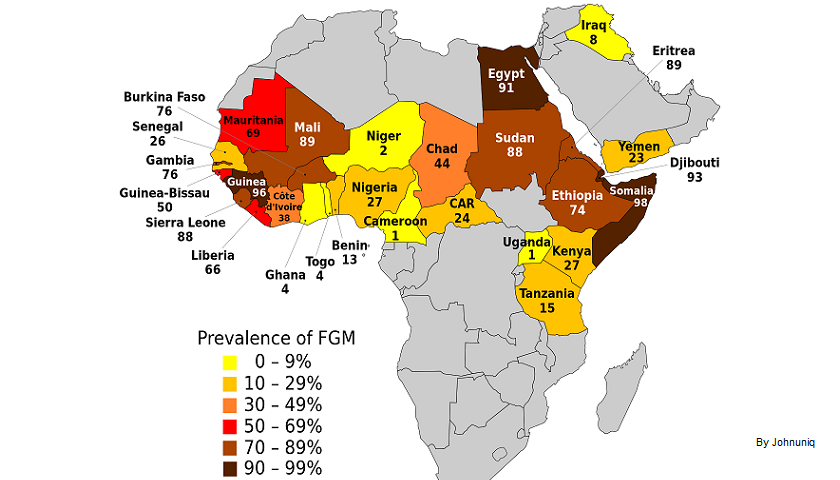The Nashville-Davidson-Murfreesboro-Franklin Metropolitan Statistical Area is ranked 20th in the country for the potential risk of female genital mutilation (FGM) being performed on women and girls, as reported by the Population Reference Bureau. Among state rankings Tennessee is number 18 overall for risk to women and girls from FGM.
Yet under the administration of Governor Bill Haslam, the Tennessee Department of Health (TDH) does not require any reporting of FGM by Tennessee healthcare providers to the TDH, so far as The Tennessee Star can determine based on publicly available records.
The 2017 mandated reporting to the TDH by healthcare providers of “diseases, events, and conditions” which includes both communicable diseases and “events” such as lead levels and carbon monoxide poisoning, but does not include any form of female genital mutilation (FGM), despite a state law passed in 2012 specifically for the purpose of reporting FGM.
The TDH’s Maternal and Child Health Services Title V Block Grant FY 2017 Application and Annual report which is administered in part for TDH initiatives related to Maternal and Child Health (MCH), specifically references the FGM prohibition as one of the state laws that provide “basic protections for the MCH population” and which applies to TDH’s use of the requested funds.
However, there is nothing in the grant application’s stated priority issues for the MCH population showing that FGM is included in any category listed such as “adverse childhood experiences”or “reduce the burden of injury among children and adolescents.”
FGM was criminalized as a class D felony in Tennessee by the Prohibition of Female Genital Mutilation Act of 1996. Despite the absence of a reporting requirement specific to FGM, in 2011, twenty-one cases of FGM were documented and reported in Tennessee. The following year Tennessee’s law was updated to require that healthcare providers report cases of FGM to law enforcement.
The 1996 bill sponsored by Democrats Sen. Thelma Harper and Rep. Lois DeBerry (deceased), specifically recognized that the occurence of FGM in Tennessee required a legislative response because:
“WHEREAS, due to the immigration of people from countries where female genital mutilation is practiced, the mutilation has continued to take place in the United States. Usually the immigrants will either send their daughters back to the native country to have female genital mutilation performed or a group of them will pay to bring a midwife to the United States to perform the painful procedure on their young daughters…”
Federal contractors in Tennessee have been resettling refugees from countries where FGM is practiced. Among the largest groups of brought to Tennessee between 2011 when twenty-one cases of FGM were reported and 2017, include refugees from Iraq, Somalia and Sudan. Numbers reported by the U.S. State Department for this period of time for refugees resettled in Tennessee include: 1,992 Iraqis, 1411 Somalis and 306 Sudanese.
Included in a 2015 Metro Nashville “health equity report” was a statement from former Nashville Mayor Karl Dean’s Office of New Americans:
“The number of foreign-born residents in Nashville has more than doubled over the past decade. Nearly 12% of our population was born outside of the United States, and nearly half of those people are recent immi- grants who entered the country since 2000. In fact, in 2012, Nashville had the fastest-growing immigrant population of any American city.
Today Nashville is the proud home of the nation’s largest Kurdish population, as well as growing enclaves of immigrants from Somalia, Sudan and all over the world.”
A 2013 BBC documentary titled “Dropping the Knife” was created to expose the practice of female genital mutilation in Kurdistan. Even though FGM was banned in 2011, Human Rights Watch reported one year later that the Kurdistan Regional Government had done little to enforce the law.
A 2014 study of almost 2,000 women in Erbil, Iraqi Kurdistan, showed reporting of FGM at 70% (self-reported), but a lower 58.6% upon clinical examination but still concluded that the “[p]revalence of female genital mutilation among Muslim Kurdish women in Erbil city is very high.”
UNICEF’s updated 2016 data shows that 98% of Somali and 87% of Sudanese women and girls have been mutilated.
Governor Haslam has voiced strong and consistent support for continued refugee resettlement in Tennessee even in the absence of publicly available and verifiable enforcement of state law intended to protect women and girls from female genital mutilation which poses a serious and dehumanizing risk to women and girls living in Tennessee.






[…] or resource to FGM, even as an “adverse childhood experience.” Despite the estimated high risk to women and girls in Tennessee from FGM the TN Department of Health has elected not to address the […]